

A School With No Teachers, Where Students Teach Themselves. Big Ideas UTC Library/Flickr.
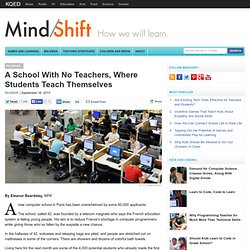
What does Common Core look like in the classroom? Photo by Todd Nesloney Imagine if you could stop struggling to meet endless standards and simply teach the way you wanted.
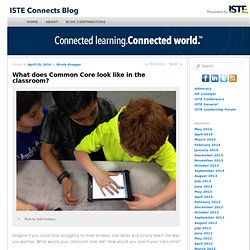
What would your classroom look like? How would you spend your class time? Chances are, your vision isn’t too far off from what a successful Common Core classroom looks like. The prospect of implementing the Common Core State Standards may seem daunting, but it’s not as hard as it sounds, said English language arts teacher and education consultant Catlin Tucker — especially for teachers who have been champing at the bit to introduce more student-centered learning into their classrooms. “My goal as a presenter is to make the Common Core feel accessible and to highlight what I see as a real opportunity to shift from traditional, lower-order thinking activities to more student-centered engaging activities that use technology,” said Tucker, who will present a webinar on “ISTE Standards and the Common Core Integration in Action.”
3 Significant Benefits Of Social Learning. 3 Significant Benefits Of Social Learning by Jakub Piwnik, brainly.com Technology influences education.
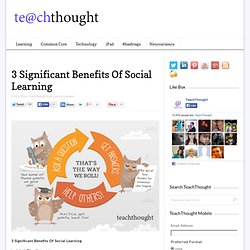
Do You have the Personality To Be an Inquiry-Based Teacher? By Thom Markham So far, the challenges of transforming education into a system capable of inspiring students to become skillful, creative, knowledgeable problem-solvers fall into familiar territory: What types of curriculum, standards, skills, strategies, and adaptations to classroom teaching methods will be necessary to do this?
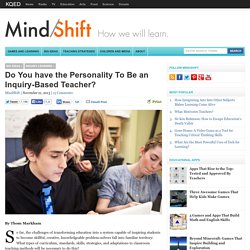
But it’s likely these will prove to be secondary questions. As education crosses the divide between a transmission model and an inquiry model, a more pressing issue will be apparent: How do we identify, attract, nurture, and train teachers who have an “inquiry-friendly” personality? The issue already is in view. When a teacher comes out from behind the lectern, leaves the front of the room, kneels beside a student to coach them through a problem, offers feedback designed to promote confidence and perseverance, and becomes a true partner in the learning process, the relationship between teacher and student automatically shifts.
These are trainable skills. Related. Laws and Ethics Can’t Keep Pace with Technology. Vivek Wadhwa Employers can get into legal trouble if they ask interviewees about their religion, sexual preference, or political affiliation.
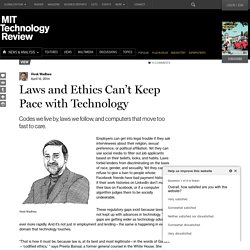
Yet they can use social media to filter out job applicants based on their beliefs, looks, and habits. Laws forbid lenders from discriminating on the basis of race, gender, and sexuality. Smart safety: YouTube's 'neighborhood watch program' In every neighborhood, there are neighbors and then there are visitors, and it’s mostly the neighbors who make it what it really is – great to hang out in or maybe not so much.
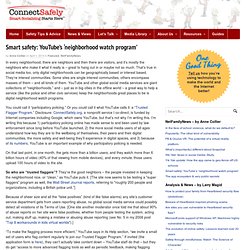
That’s true in social media too, only digital neighborhoods can be geographically based or interest based. They’re interest communities. Some sites are single interest communities, others encompass masses of them – and all kinds of them. YouTube and other global social media services are giant collections of “neighborhoods,” and – just as in big cities in the offline world – a great way to help a service (like the police and other civic services) keep the neighborhoods great places to be is digital neighborhood watch programs. You could call it “participatory policing.” On that last point, in one month, the gets more than a billion users, and they watch more than 6 billion hours of video (40% of that viewing from mobile devices), and every minute, those users upload 100 hours of video to the site.
Related links. This Little-Known iOS Feature Will Change the Way We Connect. Photo: Josh Valcarcel/WIRED A new iOS app called FireChat is blowing up in the App Store.

But it’s not the app itself that’s causing such a stir, it’s the underlying networking technology it taps into. The idea behind FireChat is simple. It’s a chatting app. School Report - Stars of CBBC's Dixi talk about the importance of social networking safety. 12 February 2014Last updated at 12:10 By BBC News School Reporters Marple Hall School.
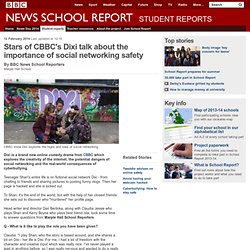
School Report - Olympic gymnast Beth Tweddle advises students on online safety. 11 February 2014Last updated at 19:00 By Lili and Neha The St Marylebone CE School.
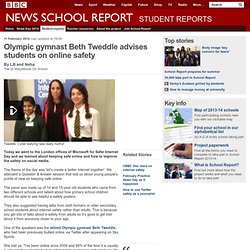
Online porn and bullying - children 'need more protection' 19 March 2014Last updated at 03:17 ET.
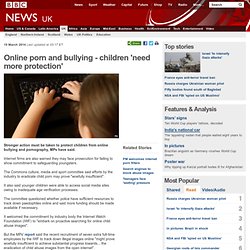
Porn site age-check law demanded by media regulator. 27 March 2014Last updated at 20:14 ET By Leo Kelion Technology reporter Atvod thinks age blocks are needed to prevent children downloading adult material A UK industry regulator has called for the law to be changed to require pornography sites to carry out age checks before granting access. Video-on-demand watchdog Atvod said the government must act to protect children from seeing graphic adult material. It said credit and debit card operators would be forbidden from processing payments from British customers to sites that did not comply. How to Turn Bland Text into Sparkling Online Content.
Teachers need 'clearer' social networking rules, unions say. 12 March 2014Last updated at 03:02 ET One union claims the guidelines may encourage teachers' use of social media Teachers using social media websites should receive clearer guidance, unions have said, in the wake of several high profile disciplinary cases. The General Teaching Council for Wales (GTCW) said five out of 21 cases last year involved teachers interacting with pupils on sites such as Facebook.
Why Snapchat is screwed. By Shane Snow On November 25, 2013 (This post originally appeared on LinkedIn Influencers. Follow Shane Snow.) Last week, Business Insider chief Henry Blodget wrote a post titled, “EXCLUSIVE: How Snapchat Plans To Make Money.”